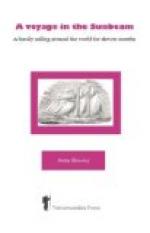Saturday, October 14th.—Light winds and calms prevailed the whole day. About 2 p.m. we were off the island of Socorro. In the afternoon a large shoal of whales came round the yacht. I was below when they first made their appearance, and when I came on deck they were spouting up great jets of water in all directions, suggestive of the fountains at the Crystal Palace. We were lying so still that they did not seem to be in the least afraid of us, and came quite close, swimming alongside, round us, across our bows, and even diving down under our keel. There was a shoal of small fish about, and the whales, most of which were about fifty or sixty feet in length, constantly opened their huge pink whalebone-fringed mouths so wide that we could see right down their capacious throats. The children were especially delighted with this performance, and baby has learned quite a new trick. When asked, ‘What do the whales do?’ she opens her mouth as wide as she can, stretches out her arms to their fullest extent, then blows, and finishes up with a look round for applause.
Soon after 8 p.m. the wind completely died away, and, fearing further detention, we once more got up steam.
Sunday, October 15th.—Still calm. We had the litany and hymns at 11 a.m.; prayers and hymns and a sermon at 5 p.m. In the course of the afternoon we were again surrounded by a shoal of whales. We passed the island of Chiloe to-day, where it always rains, and where the vegetation is proportionately dense and luxuriant. It is inhabited by a tribe of peculiarly gentle Indians, who till the ground, and who are said to be kind to strangers thrown amongst them. Darwin and Byron speak well of the island and its inhabitants, who are probably more civilised since their time, for a steamer now runs regularly once a week from Valparaiso to San Carlos and back for garden produce. The potato is indigenous to the island.
[Illustration: Catching Cape Pigeons in the Gulf of Penas]
Tuesday, October 17th.—At 6 a.m., there being still no wind, Tom, in despair of ever reaching our destination under sail alone, again ordered steam to be raised. Two hours later a nice sailing breeze sprang up; but we had been so often disappointed that we determined to continue steaming. Just before sunset we saw the island of Mocha in the distance. It is said to have been inhabited at one time by herds of wild horses and hogs, but I think they have now become extinct.
One of our principal amusements during the calm weather has been to fish for cape-pigeons, cape-hens, gulls, and albatrosses, with a hook and line. We have caught a good many in this way, and several entangled themselves in the threads left floating for the purpose over the stern. The cape-pigeons were so tame that they came almost on board, and numbers of them were caught in butterfly-nets. Their plumage is not unlike grebe, and I mean to have some muffs and trimmings for the children made out of it. Allen, the coxswain of the gig, skins them very well, having had some lessons from Ward before we left England. I want very much to catch an albatross, in order to have it skinned, and to make tobacco-pouches of its feet and pipe-stems of the wing-bones, for presents.




